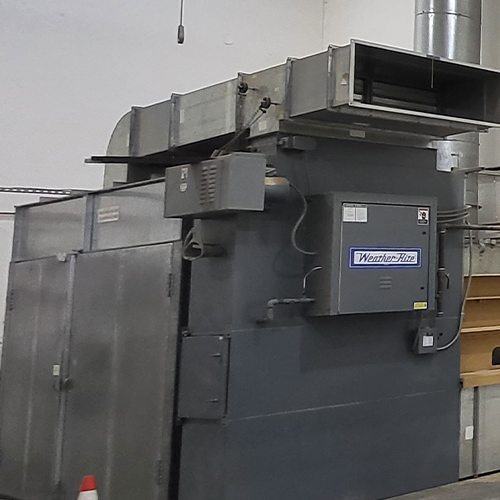

A research team, coordinated by the Oklahoma Aerospace and Defense Innovation Institute at the University of Oklahoma, is working with members of the 76th Maintenance Wing at the Oklahoma City Air Logistics Complex to develop a novel chromium-free organic primer for aerospace applications.
John Klier, Ph.D., dean of Gallogly College of Engineering and co-principal investigator for the research project, is leading the project alongside Brian Grady, Ph.D., a professor in the School of Chemical, Biological and Materials Engineering, in partnership with the Oklahoma City Air Logistics Complex. OC-ALC technical leads are Blake Yort and Ross Moseley.
Currently, chromium compounds are added to paints and primers to provide protection against corrosion and create certain colors. Hexavalent chromium is a toxic form of chromium with can cause severe health effects to those exposed, according to the Occupational Safety and Health Administration.
“Hexavalent chromium is the benchmark in corrosion protection but is also a known carcinogen and environmental hazard. Removing chromium from the primer will eliminate worker exposure during depot and field maintenance. The Air Force spends billions of dollars per year on corrosion maintenance, so it is critical that any new primers provide equivalent corrosion protection,” said Evan Mertes, with the 76th Maintenance Wing.
Klier says they are working to evaluate and identify epoxy-based primer compositions that help the U.S. Air Force eliminate the use of hexavalent chromium and reduce environmental impact and the associated costs with its use and disposal.
“These primers will provide excellent corrosion protection and adhesion to pretreated aluminum alloys while offering exceptional fluid resistance and outstanding flexibility,” he said.
Klier said the research team has developed several chrome-free prototype additive systems, and that spray and testing infrastructure are in place. Application and evaluation of the formulation are underway. The two-year project is expected to be completed in 2023.
For more news about the Oklahoma Aerospace and Defense Innovation Institute at the University of Oklahoma, visit ou.edu/oadii.
The Oklahoma Aerospace and Defense Innovation Institute at the University of Oklahoma brings together the full range of the university’s capabilities and resources to provide holistic solutions addressing the aerospace, defense, and global security challenges of today and tomorrow. By uniting the vast resources of a major research university with a network of industry and government partners, OADII advances security, liberty, and prosperity for our state, nation, and world.
The Oklahoma City Air Logistics Complex, Tinker Air Force Base, Oklahoma, is one of the largest units in the Air Force Materiel Command, with a team of over 10,300 military and civilian professionals delivering combat power for America. The complex performs programmed depot maintenance and modifications on KC-46, KC-135, B-1B, B-52, E-3 and Navy E-6 aircraft maintenance, repair and overhaul for F100 (Exchangeable workload), F101, F108, F110 (Exchangeable workload), F117, F118, F119 (Exchangeable workload), F135 (ACI inspections), TF33 engines and a wide variety of commodities for the Air Force, Navy, Marine Corps, and foreign military sales. The complex is responsible for the development and sustainment of a diverse portfolio of mission-critical software for the Air Force and diverse other customers, as well as worldwide aircraft battle damage repair capability for multiple weapon systems.